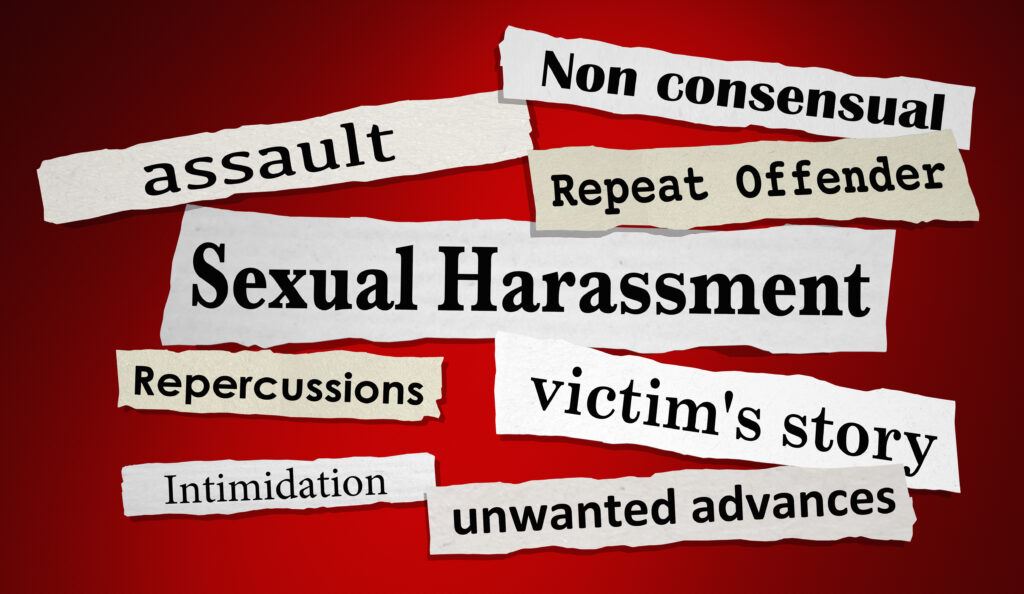Sex crimes encompass a range of illegal acts involving sexual behavior. If you ultimately incur a conviction on a sex crime charge, you may face jail time, monetary fines, and other high penalties. Additionally, you may face numerous collateral consequences, including the inability to find a job or a place to live.
If you face a sex crime charge, consult an experienced sex crime attorney right away. Your lawyer can promptly evaluate your case, determine effective legal defenses, and aggressively advocate on your behalf during all legal proceedings.
Categories of Sex Offenses
Sex crimes are extremely serious and carry heavy penalties upon conviction.
Some of the most common categories of sex offenses include:

- Rape – This is one of the most severe sex crimes and involves non-consensual sexual intercourse. Rape can occur under various circumstances, including when the victim is physically forced, threatened, or incapacitated and unable to give consent. Statutory rape falls under this category and refers to sexual activity with a minor who is legally unable to provide consent due to age.
- Sexual Assault – Sexual assault is a broader term that includes any unwanted sexual contact. This can range from groping to forced oral sex. Unlike rape, sexual assault doesn’t necessarily involve penetration but still involves non-consensual acts that violate a person’s body and autonomy.
- Child Molestation – This crime involves sexual contact with a minor (the specific age can vary by jurisdiction). Child molestation encompasses a range of behaviors, from touching to engaging a child in sexual acts.
- Indecent Exposure – This involves exposing one’s genitals in public with the intent to shock or offend others.
- Sexual Exploitation – This category includes acts like forcing someone into prostitution or producing and distributing child pornography.
- Sexual Harassment – Sexual harassment involves unwelcome sexual advances, requests for sexual favors, and other verbal or physical conduct of a sexual nature in the workplace or other settings.
- Voyeurism – This involves spying on someone without their consent, typically for sexual gratification. Common examples include peeping into windows or using hidden cameras to record private activities.
If you face charges for any of these sex crimes, an experienced criminal defense lawyer in your area can determine your options and protect your legal rights and interests.
Potential Penalties for a Sex Crime Conviction Beyond Jail Time
A conviction for a sex crime carries severe consequences beyond just jail time.
Some of these potential penalties include:
- Mandatory Sex Offender Registration – One of the most significant penalties is the requirement to register as a sex offender. This registry is public and can severely affect the individual’s life. Registered sex offenders often face restrictions on where they can live, work, and visit. Being on this registry can also lead to social stigma, making it difficult to reintegrate into society.
- Probation – Individuals may receive probation instead of or in addition to jail time. This means they can live in the community but under strict supervision. Probation conditions can include regular meetings with a probation officer, curfews, travel restrictions, and mandatory counseling or treatment programs. Violating these conditions can result in additional penalties or jail time.
- Electronic Monitoring – Individuals may need to wear an electronic monitoring device, such as an ankle bracelet. This device tracks their movements to ensure they comply with court-imposed restrictions, such as staying away from certain areas like schools or parks.
- Mandatory Counseling and Treatment Programs – Courts often mandate participation in counseling or treatment programs designed to address sexual behavior issues. These programs can include therapy sessions, educational workshops, and other rehabilitative services aimed at preventing reoffending.
- Community Service – Individuals may be ordered to complete several community service hours. This penalty aims to repay the community and can be part of a broader strategy to rehabilitate the individual.
- Fines and Restitution – Financial penalties are also common in sex crime cases. Individuals may have to pay substantial fines to the state. Additionally, they may be ordered to pay restitution to the victims, covering costs like medical bills, therapy, and other expenses related to the offense.
All of these penalties demonstrate the long-term consequences a sex crime conviction can have on an individual’s life.
Collateral Consequences of a Sex Crime Conviction
A sex crime conviction carries not only legal penalties but also numerous collateral consequences that can profoundly affect an individual’s life.
These consequences extend far beyond jail time or fines and can alter various aspects of daily living.

- Social Stigma and Isolation – Convicted sex offenders often face severe social stigma. Friends, family, and community members may distance themselves, leading to social isolation. The sex offender label can result in social ostracization, making it difficult to build and maintain relationships.
- Employment Challenges – Finding and keeping a job can be exceedingly difficult for someone with a sex crime conviction. Many employers conduct background checks and may refuse to hire individuals with such a record.
- Housing Instability – Securing housing is another major challenge. Many landlords are reluctant to rent to convicted sex offenders – especially those who appear on public registries. Additionally, sex offenders face legal restrictions on where they can live, such as proximity to schools, parks, or other places where children gather.
- Educational Barriers – A sex crime conviction can also affect educational opportunities. Some colleges and universities may deny admission to individuals with such convictions. Additionally, if the crime involved minors, the law may prevent them from attending institutions where minors are present, severely limiting their educational prospects.
- Loss of Voting Rights – In some jurisdictions, individuals convicted of sex crimes may lose their right to vote, either temporarily or permanently. This disenfranchisement can leave individuals feeling further disconnected from society and unable to participate fully in civic life.
- Travel Restrictions – International travel also becomes complicated for convicted sex offenders. Many countries have strict entry restrictions or outright bans on individuals with sex crime convictions. They may face restrictions on domestic travel, particularly if the individual is on probation or parole.
- Effects on Family Relationships – Family dynamics often suffer significantly. Convicted sex offenders may face restrictions on contact with their own children, including supervised visitation or loss of custody. The strain on family relationships can be significant, leading to long-term emotional and psychological effects for both the convicted sex offender and their loved ones.
- Mental Health Issues – The combination of legal penalties, social stigma, and personal losses can lead to serious mental health issues, such as depression, anxiety, and suicidal thoughts. The stigma surrounding a conviction makes it difficult to obtain crucial mental health support.
Successfully Defending Against a Sex Crime Charge
An accused individual and their legal team may use several defenses to establish innocence or reduce culpability:
- Consent – One of the most common defenses is that the alleged victim consented to the sexual activity in question. You can use this powerful defense in cases that only involve adults, and where evidence, such as text messages or witnesses, suggests mutual consent. However, consent is not a valid defense in cases involving minors or individuals unable to give legal consent due to age, mental incapacity, or intoxication.
- Mistaken Identity – Another defense is mistaken identity, which asserts that the defendant did not commit the crime. This defense gains weight when the alleged victim doesn’t know the perpetrator, as identification hinges on methods like lineups or photo arrays, which have inherent weaknesses. Alibi evidence, like witness testimony or surveillance footage proving the defendant was elsewhere at the time of the crime, can support this defense.
- False Accusations – False accusations can arise for various reasons, including personal vendettas, custody battles, or attempts to gain an advantage in a different legal matter. Demonstrating inconsistencies in the accuser’s story, lack of evidence, or motives for making a false claim can help to establish this defense.
- Insufficient Evidence – The burden of proof lies with the prosecution, which must prove the defendant’s guilt beyond a reasonable doubt. A defense attorney may argue that the evidence presented fails to meet this standard. This can involve challenging the credibility of witnesses, the validity of physical evidence, or the reliability of forensic methods used.
- Mental Incapacity or Insanity – In some cases, the defense may argue that the accused lacked the mental capacity to understand the nature of their actions or distinguish right from wrong at the time of the crime. This defense typically requires expert testimony from mental health professionals and can lead to a verdict of not guilty by reason of insanity.
- Entrapment – Entrapment occurs when law enforcement officials induce someone to commit a crime they would not have otherwise committed. If the defense can show that undercover officers or informants coerced or manipulated the defendant into committing the sex crime, this defense may apply.
- Statute of Limitations – In some jurisdictions, sex crime cases must meet a statute of limitations, limiting the timeframe for prosecutors to file charges. If the prosecution files charges after the statute of limitations has expired, the defense can seek dismissal of the case.
Each case is unique, so the defense strategy depends on the specific circumstances and evidence involved.
What Is a Plea Deal in a Sex Crime Case?

A plea deal, also known as a plea bargain, is an agreement between the accused individual (i.e. the defendant) and the prosecutor in a criminal case. In exchange for the defendant pleading guilty to a charge, the prosecutor agrees to a lesser charge or a reduced sentence.
Plea deals are common in sex crime cases due to the complex nature of these cases and the severe penalties involved.
Understanding a Plea Deal:
In a plea deal, the defendant usually pleads guilty to a lesser offense or agrees to a specific punishment, including reduced jail time, probation, or fines. This agreement avoids the uncertainty of a trial and can result in a quicker resolution.
For example, in a sex crime case, a defendant may plead guilty to a charge of sexual misconduct instead of facing a trial for a more severe charge like rape.
Advantages of Accepting a Plea Deal:
- Reduced Sentencing – One of the main benefits is the possibility of a lighter sentence than what may result from a trial. This can mean less jail time or alternative penalties, such as probation.
- Certainty – Trials are unpredictable. Accepting a plea deal provides certainty about the outcome, avoiding the risk of being found guilty at trial and receiving a harsher sentence.
- Quicker Resolution – Trials can also be lengthy and stressful. A plea deal can resolve the case much faster, allowing the defendant to move forward sooner.
- Lower Costs – Trials can cost a lot of money due to legal fees, expert witnesses, and other related costs. A plea deal can significantly reduce these expenses.
Disadvantages of Accepting a Plea Deal:
- Admission of Guilt – Accepting a plea deal requires the defendant to plead guilty, which means having a criminal record. This can have long-term consequences for employment, housing, and personal relationships.
- Limited Appeal Options – The defendant typically waives their right to appeal the conviction by pleading guilty, limiting future legal recourse.
- Potential for Stigma – Even with a lesser charge, the social stigma associated with a sex crime conviction can be significant and damaging.
Should You Accept a Plea Deal?
Deciding whether to accept a plea deal depends on the strength of the evidence, the potential penalties, and personal circumstances.
Consult an experienced criminal defense attorney who can provide advice based on the specifics of your case. They can help you weigh the pros and cons, ensuring that you make an informed decision.
Contact an Experienced Criminal Defense Lawyer as Soon as Possible
If you face a sex crime charge, you want an experienced criminal defense attorney in your corner advocating for you every step of the way. Your lawyer can explain all of your options, aggressively fight for your interests, and pursue the best possible result in your case.


